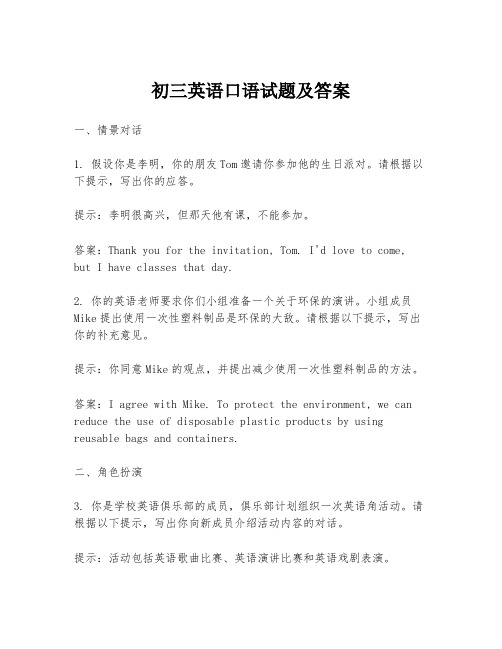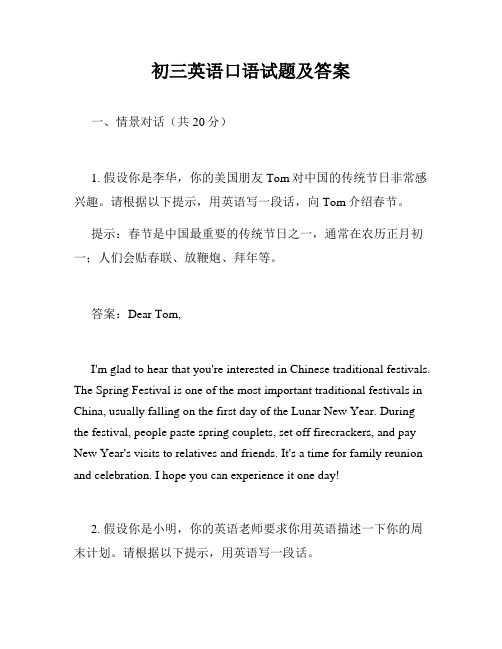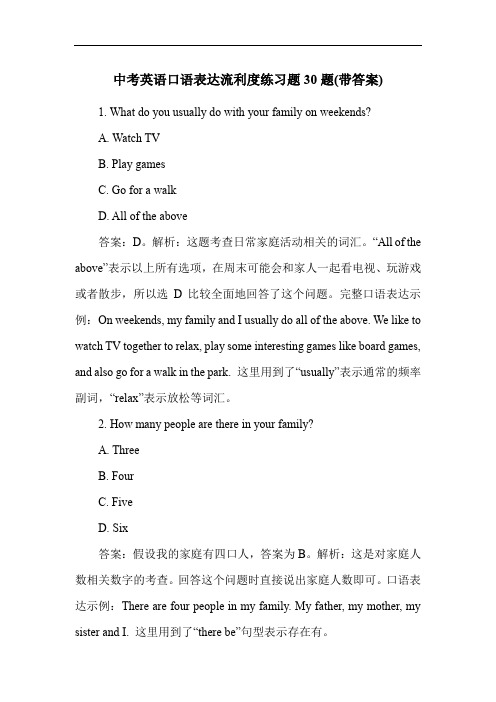英语中考-口语 练习题
初三英语口语试题及答案

初三英语口语试题及答案一、情景对话1. 假设你是李明,你的朋友Tom邀请你参加他的生日派对。
请根据以下提示,写出你的应答。
提示:李明很高兴,但那天他有课,不能参加。
答案:Thank you for the invitation, Tom. I'd love to come, but I have classes that day.2. 你的英语老师要求你们小组准备一个关于环保的演讲。
小组成员Mike提出使用一次性塑料制品是环保的大敌。
请根据以下提示,写出你的补充意见。
提示:你同意Mike的观点,并提出减少使用一次性塑料制品的方法。
答案:I agree with Mike. To protect the environment, we can reduce the use of disposable plastic products by using reusable bags and containers.二、角色扮演3. 你是学校英语俱乐部的成员,俱乐部计划组织一次英语角活动。
请根据以下提示,写出你向新成员介绍活动内容的对话。
提示:活动包括英语歌曲比赛、英语演讲比赛和英语戏剧表演。
答案:Hello, welcome to our English Club! We are organizingan English Corner event which includes an English song contest, an English speech contest, and an English drama performance.4. 你的外国朋友Jack对中国的传统节日很感兴趣。
请根据以下提示,用英语向他介绍春节。
提示:春节是中国最重要的节日之一,人们会放鞭炮、贴春联、吃团圆饭。
答案:Spring Festival is one of the most importanttraditional Chinese festivals. During this time, people setoff firecrackers, paste Spring Festival couplets, and have a family reunion dinner.三、看图说话5. 观察以下图片,描述图中发生的场景。
初三英语口语试题及答案

初三英语口语试题及答案一、情景对话(共20分)1. 假设你是李华,你的美国朋友Tom对中国的传统节日非常感兴趣。
请根据以下提示,用英语写一段话,向Tom介绍春节。
提示:春节是中国最重要的传统节日之一,通常在农历正月初一;人们会贴春联、放鞭炮、拜年等。
答案:Dear Tom,I'm glad to hear that you're interested in Chinese traditional festivals. The Spring Festival is one of the most important traditional festivals in China, usually falling on the first day of the Lunar New Year. During the festival, people paste spring couplets, set off firecrackers, and pay New Year's visits to relatives and friends. It's a time for family reunion and celebration. I hope you can experience it one day!2. 假设你是小明,你的英语老师要求你用英语描述一下你的周末计划。
请根据以下提示,用英语写一段话。
提示:周六上午去图书馆;下午去公园散步;周日上午去博物馆;下午去电影院看电影。
答案:Hello, Mrs. Smith,I'm planning to have a relaxing weekend. On Saturday morning, I'll go to the library to read some books. In the afternoon, I'll take a walk in the park to enjoy the sunshine. On Sunday morning, I'll visit the museum to learn more about history and culture. In the afternoon, I'll go to the cinema to watch a movie. I'm looking forward to a great weekend!二、看图说话(共20分)3. 观察下面的图片,描述一下图中的情景,并谈谈你对这种行为的看法。
初三英语口语表达练习题20题含答案解析

初三英语口语表达练习题20题含答案解析1. —Would you like to go to the library with me after school?A. Yes, I do.B. No, I wouldn't.C. Sure, I'd love to.答案解析:C。
A 选项“Yes, I do.”是用于回答以“Do you...”开头的一般疑问句;B 选项“No, I wouldn't.”语气比较生硬,不太符合日常交际习惯;C 选项“Sure, I'd love to.”表示“当然,我很乐意”,非常适合用于回应别人的邀请。
2. —Your new dress is very beautiful.A. Thank you.B. You are welcome.C. No, it isn't.答案解析:A。
当别人赞美你的物品或外貌等时,应该用“Thank you.”表示感谢;B 选项“You are welcome.”是用于回应别人的感谢;C 选项“No, it isn't.”是对自己的物品进行否定,不符合交际习惯。
3. —I'm sorry I broke your pen.A. It doesn't matter.B. You are welcome.C. That's all right.答案解析:A 和C。
A 选项“It doesn't matter.”和C 选项“That's all right.”都可以用于回应别人的道歉,表示“没关系”;B 选项“You arewelcome.”是用于回应别人的感谢。
4. —Can I borrow your ruler?A. Yes, you can.B. No, you can't.C. Here you are.答案解析:C。
A 选项“Yes, you can.”和B 选项“No, you can't.”只是简单地回答了对方的请求,比较生硬;C 选项“Here you are.”表示“给你”,更加符合交际习惯,同时也满足了对方借尺子的需求。
2024年湖南省邵阳市中考英语口语考试专练模拟试卷(含答案)

2024中考口语考试模拟题模拟题一第一节短文朗读(共6分)你有90秒钟的时间准备朗读。
当听到“开始录音”的信号时,请立即在120秒钟内朗读短文一遍。
当听到要求“停止录音”的信号时,应立即终止朗读。
Steve is my best friend. We go skating, play football, talk about sports and go to the movies. Last year, I broke my leg. He always came over to play games with me.In school, he carried my schoolbag and got my lunch for me.I know he really cares about me and I care about him, too. Some friends may be in your life for a while. Others will be there for a long time, maybe even forever.l would hate to move unless I could take my friends with me. They are too important to leave behind.第二节情景反应(共4小题,每小题2分,共8分)你有30秒钟的时间阅读屏慕上的情景提示,然后按照情景提示的内容用英语回答问题。
当听到“开始录音”的信号后,请按照提问顺序回答问题,每道题作答时间为15秒钟。
当听到“停止录音”的信号时,应立即终止回答。
请看下面的情景提示Kate是你的笔友,她是澳大利亚人,擅长跳舞。
她妈妈每年都带她来中国玩。
1.1. ls Kate your sister? No, she isn't.2.2. Where is Kate from? She is from Australia./She comes fromAustralia.3.3.What is Kate good at? She is good at dancing.She does well in dancing4.4. How often does Kate come to China? Every year./She comes to China every year.第三节口头表达(共6分)你有2分钟的时间阅读屏幕上的要点提示,并作答题准备。
中考英语口语表达流利度练习题30题(带答案)

中考英语口语表达流利度练习题30题(带答案)1. What do you usually do with your family on weekends?A. Watch TVB. Play gamesC. Go for a walkD. All of the above答案:D。
解析:这题考查日常家庭活动相关的词汇。
“All of the above”表示以上所有选项,在周末可能会和家人一起看电视、玩游戏或者散步,所以选D比较全面地回答了这个问题。
完整口语表达示例:On weekends, my family and I usually do all of the above. We like to watch TV together to relax, play some interesting games like board games, and also go for a walk in the park. 这里用到了“usually”表示通常的频率副词,“relax”表示放松等词汇。
2. How many people are there in your family?A. ThreeB. FourC. FiveD. Six答案:假设我的家庭有四口人,答案为B。
解析:这是对家庭人数相关数字的考查。
回答这个问题时直接说出家庭人数即可。
口语表达示例:There are four people in my family. My father, my mother, my sister and I. 这里用到了“there be”句型表示存在有。
3. What is your favorite subject at school?A. EnglishB. MathC. ChineseD. Science答案:A。
解析:这题考查学校学科相关的词汇。
如果最喜欢英语,回答示例:My favorite subject at school is English. Because I can learn different cultures and communicate with people from all over the world through it. 这里“because”引导原因状语从句,“communicate with”表示与某人交流等用法。
口语中考试题及答案大全

口语中考试题及答案大全考试题1:自我介绍考官:请你用英语做一个自我介绍。
你:Sure. My name is [Your Name] and I come from [Your Home Country]. I'm [Your Age] years old. Currently, I am studying [Your Major] at [Your University]. In my free time, I enjoy [Your Hobbies or Interests]. I am really excited to be here today and have this opportunity to practice my English with you.考试题2:家庭背景考官:请你介绍一下你的家庭背景。
你:Of course. I come from a small family. There are four members in my family, including my parents, my older brother, and me. My father works as [Your Father's Occupation] and my mother is a [Your Mother's Occupation]. My brother is currently studying [Your Brother's Major] at [Your Brother's University]. We are a close-knit family and always support each other.考试题3:兴趣爱好考官:请你谈谈你的兴趣爱好。
你:Sure. I have a few hobbies that I enjoy during my free time. Firstly, I love reading books, especially novels and biographies. Reading allows me to relax and gain knowledge at the same time. Secondly, I am passionateabout playing sports, particularly basketball. It helps me stay active and socialize with friends. Lastly, I also have an interest in photography. Capturing beautiful moments and expressing my creativity through photos brings me great joy.考试题4:旅行经历考官:请你分享一次值得记忆的旅行经历。
中考英语口语表达流利度练习题30题含答案解析
中考英语口语表达流利度练习题30题含答案解析1.Your mother is waiting for you at home. You should go back_____.A.soonB.quicklyC.immediatelyD.slowly答案解析:C。
选项A“soon”表示不久,侧重于时间上的快,但不一定是行动上立刻;选项B“quickly”强调动作迅速,但不一定是马上;选项C“immediately”表示立即、马上,最符合语境,在口语表达中流畅度最高;选项D“slowly”是缓慢地,不符合题意。
2.It's time for class. Let's go to the classroom_____.A.hurriedlyB.rapidlyC.promptlyzily答案解析:C。
选项A“hurriedly”匆忙地,可能会显得比较慌乱;选项B“rapidly”快速地,更侧重于速度快;选项C“promptly”及时地、迅速地,在这个场景下表达去教室很恰当,流畅度高;选项D“lazily”懒散地,不符合去上课的场景。
3.You look tired. You need to have a rest_____.A.at onceB.right nowC.soon afterter on答案解析:A。
选项A“at once”立刻,强调马上行动,流畅度高;选项B“right now”现在、此刻,比较口语化,但没有“at once”那么强的立刻感;选项C“soon after”稍后,不是马上休息;选项D“later on”以后,不符合累了需要马上休息的语境。
4.There is a lot of homework to do. You should start_____.A.soonB.immediatelyterD.slowly答案解析:B。
选项A“soon”不久,不够立刻;选项B“immediately”马上,对于有很多作业要做的情况,马上开始是最好的,流畅度高;选项C“later”稍后,会拖延;选项D“slowly”缓慢地,做作业不能缓慢开始。
初三英语口语表达练习题20题含答案解析
初三英语口语表达练习题20题含答案解析1. —Hello! Nice to see you.—________.A. Hello! Nice to see you, too.B. Goodbye!C. See you later.D. I'm fine.答案解析:A。
当别人说“Nice to see you.”时,回应应该是“Nice to see you, too.”。
B 选项“Goodbye!”是再见的意思;C 选项“See you later.”也是再见的意思;D 选项“I'm fine.”是回答“How are you?”的。
2. —This is my friend, Tom.—________.A. Nice to meet you.B. How are you?C. I'm fine.D. See you later.答案解析:A。
当别人介绍朋友给你认识时,应该说“Nice to meet you.”。
B 选项“How are you?”是询问对方身体状况;C 选项“I'm fine.”是回答“How are you?”的;D 选项“See you later.”是再见的意思。
3. —Thank you for your help.—________.A. You're welcome.B. That's right.C. No problem.D. All of the above.答案解析:D。
对于别人的感谢,可以用“You're welcome.”“That's right.”“No problem.”来回应。
“You're welcome.”是最常用的;“That's right.”在这里可以理解为“这是应该的”;“No problem.”表示“没问题,小事一桩”。
4. —I'm sorry I'm late.—________.A. It doesn't matter.B. You're welcome.C. That's all right.D. Both A and C.答案解析:D。
初三英语口语表达练习题30题含答案解析
初三英语口语表达练习题30题含答案解析1. —Could you pass me the book?—Sure. Here you are.—________.A. Thank youB. You are welcomeC. No problemD. Excuse me答案解析:A。
当别人递给你东西时,要说“Thank you”表示感谢。
B 选项“You are welcome”是在别人向你表示感谢时的回应;C 选项“No problem”通常用于回应别人的请求,表示没问题;D 选项“Excuse me”用于引起别人注意或表示歉意等情况。
2. —I'm sorry I'm late.—________.A. It doesn't matterB. Don't say soC. You're wrongD. No way答案解析:A。
当别人道歉时,可以用“It doesn't matter”表示没关系。
B 选项“Don't say so”不太符合英语表达习惯;C 选项“You're wrong”是说别人错了,不合适;D 选项“No way”表示没门,也不符合语境。
3. —How are you?—________.A. I'm fine, thanksB. How do you do?C. Nice to meet youD. Good morning答案解析:A。
“How are you?”的常见回答是“I'm fine, thanks.”。
B 选项“How do you do?”通常用于初次见面打招呼;C 选项“Nice to meet you”也是用于初次见面;D 选项“Good morning”是早上好。
4. —What's your favorite subject?—________.A. EnglishB. RedC. ApplesD. Monday答案解析:A。
中考英语口语表达流利度练习题30题
中考英语口语表达流利度练习题30题1. You meet a friend on the street. What can you say to greet him/her?A. Hello! How are you?B. Hi! What's up?C. Good morning! How's it going?答案:B。
“Hi! What's up?”是非常口语化且简洁的打招呼方式,能快速开启对话,提高口语表达流利度。
“Hello! How are you?”比较正式,在日常对话中相对不那么流畅。
“Good morning! How's it going?”在特定时间使用,不够灵活。
2. Your friend asks you if you want to go to the movies. What's a good response?A. Yes, I do. I'd love to.B. Sure! Let's go.C. I think so. Maybe later.答案:B。
“Sure! Let's go.”直接表达了肯定和行动意愿,非常流畅。
“Yes, I do. I'd love to.”比较啰嗦。
“I think so. Maybe later.”不够明确。
3. You want to ask your teacher for help. What can you say?A. Excuse me, teacher. Can you help me?B. Teacher, I need your help.C. Pardon me, sir/madam. Could you please help me?答案:A。
“Excuse me, teacher. Can you help me?”比较礼貌且简洁,容易说出口。
- 1、下载文档前请自行甄别文档内容的完整性,平台不提供额外的编辑、内容补充、找答案等附加服务。
- 2、"仅部分预览"的文档,不可在线预览部分如存在完整性等问题,可反馈申请退款(可完整预览的文档不适用该条件!)。
- 3、如文档侵犯您的权益,请联系客服反馈,我们会尽快为您处理(人工客服工作时间:9:00-18:30)。
My father always drives me to school in the morning. How do you go to school?I often go to school on foot./ I go to school by bus/ by bus, No.11 / by bike.2.I am going to the super market this evening. Why not come with me? I¡¯d be glad to. / I¡¯d be happy to./ Okay./ No, thank you./ Sorry, I¡¯ll be busy then.3.You look sad, what¡¯s the matter with you?I failed the exam. / My grandfather is ill in hospital.4.I go to Guangzhou library once a week. How often do you go there? Once/ Twice a month./ Never./Sometimes./ Whenever I¡¯m free, I¡¯ll go there.5.When does your teacher usually begin the class in the afternoon?At about 2:00/ 2:30/ 3:00.6.Are you free next Wednesday evening? I¡¯d like you to go to the cinema with me.Yes, I¡¯d like to. / Sorry, I have to see my friends at that time./ I¡¯d love to, but I ¡-7.When shall we meet, this evening or tomorrow evening?Either is OK./ This evening. /Tomorrow evening.8.I always get up early in the morning. What time do you usually get up? At 6£º30£¯7£º00 o¡¯clock¡-./ I usually get up at¡-..9.Excuse me. May I use your dictionary?Yes, here you are./ Sorry, I have no dictionary. / Sorry, I am using it.10.You must look after yourself and keep healthy.Yes, I will. Thanks. / Ok. I will.11.You look tired, why don¡¯t you rest for a while?Yes£¬I wi11. Thank you. / No, I need to finish doing¡-. First. / Thanks, but there¡¯ s no need.12.I think foreign languages are more interesting than science.I really can¡¯t agree with you. I prefer science. / I agree with you./ Yes, I think so.13.I play sports three times a week£®How often do you have sports?Once/ Twice a week./ Every day./ Never./ Always./ Often.14.Oh, I have a high fever and a headache.I¡¯m sorry to hear that./ Why not go to see a doctor?/ Have you seen a doctor?/ You¡¯d better take some medicine.15.Excuse me. Can you tell me where the bookshop is?Look! It¡¯s on the other side of the road./ Sorry, I am new here. You can ask the policeman over there.16.We are going to the reading-room this afternoon. What about coming withus?I¡¯d be glad to/ I¡¯d be happy to./ Okay./ No, thank you./ Sorry, I¡¯ll be busy./ I can¡¯t today.17.Excuse me. Could you tell me how I can get to the supermarket?Go straight ahead. Then cross the bridge and turn right at the bookshop. You'll find it. / Sorry, I don¡¯t know. You¡¯d better ask that man over there.18.Great, I passed the most difficult physics exam.Congratulations! / Glad to hear that. £¯Lucky you!£¯Well done!£¯That¡¯s wonderful news.£¯Good for you.19.It takes me 20 minutes to get to school. How long does it take you?15 minutes by bike.£¯8 minutes by bus. / 30 minutes on foot.£¯It takes me¡-.£¯ten minutes. / I¡¯m not sure.20.I want to be a teacher in the future. What about you?I want to be a football player./ dancer./ singer. ¡-21.I hope you can come to the dance next Saturday.I¡¯m sorry I can¡¯t. / OK. I will come. /I¡¯d love to. But I must stay at home then / Sure, I will.22.I listen to music every night before going to bed. How often do you listen to music?Every night. £¯Always./ Never.£¯Sometimes.£¯Seldom.£¯Rarely.£¯I don¡¯t like music.23.Thank you so much for telling me the good news.You¡¯re welcome.£¯My pleasure.£¯No problem£¯That¡¯s OK£¯Please don¡¯t tell anyone else.24.How far is the post office, please?Only a few kilometers./ It¡¯s just beside the market./ It¡¯s much far away. You¡¯d better take No. 1 Bus there.25.I like collecting stamps. What¡¯s your favourite hobby?I like collecting stamps, too. / I like singing. / My favourite hobby is cooking.26.We¡¯re going to watch a new movie this evening. Why not join us?I'd be glad to£¯I'd be happy to. / Okay. / No, thank you./ No, I¡¯ll be busy./ What¡¯s on?27.How many students are there in your class?Fifty. / Forty-five.28.I like your sports shoes. Where can I get a pair?You can go to ¡-. shop.£¯Why not go to the supermarket nearby?£¯Sorry, I don¡¯t know (my mother bought it for me). £¯I bought this at¡-.29.Will you please tell me the way to the railway station?Go down this street. At the end of the road you¡¯ll see it.30.What color is your mobile phone?Red. / Black. / Sorry, I have no mobile phone. / I haven¡¯t got one.31.Will you come and join us in dinner on Sunday£¿。
